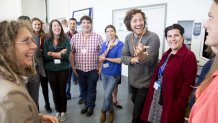Articles

Photo by Matt Jessop.
Showcasing the ESI
The ESI recently held a two-day Science Showcase event in which academics, researchers and PhD students came together to share with an eminent visitor, campus colleagues and each other the inter-disciplinary research taking place in the Institute.
The visitor, Professor Dame Georgina Mace, FRS, is Head of the Centre for Biodiversity and Environment Research at University College London. Professor Mace has been President of the British Ecological Society as well as of the Society for Conservation Biology, and won the International Cosmos prize in 2007. In addition, she was the last Chair of the international programme on biodiversity science, DIVERSITAS (2012-2014), which merged into the Future Earth Programme in 2014.
Her remit – at the invitation of the University – was to assess how faithful the ESI has been to its interdisciplinary aspirations; her visit afforded often stretched and under-pressure professionals the chance not just to tell colleagues all about their work, but to listen to others talk about theirs too.
On the Showcase’s first day, the whole Institute suspended normal working and was given over to presentations, demonstrations, discussions, Q&As and less formal chances to mix and talk. Professor Mace heard about, among other things, Renewables, Drones, Human Wildlife Interactions, Small Organisms, Pollinators, Complex Risks and the Impacts of Climate Change.
The second day saw a series of smaller, more intimate presentations on these and related topics, as Professor Mace was shown around the building with Professor Nick Talbot, Deputy Vice-Chancellor (Research and Impact), enjoying opportunities to talk one-to-one with academics, researchers and PhD students.
Gail Eastaugh, the ESI’s Manager, said: "After all the planning and hard work which went in to this, it was immediately clear what the rewards were of running this event. People who are often too busy to think about others’ work were able to listen, talk to and mix with all their peers.The energy and conversations generated were significant enough, but, even more, the event was an opportunity properly to celebrate the enormous amount of work done here in the last three or so years."
In her preliminary feedback, Professor Mace said: "I found the ESI to be a vibrant community of engaged and enthusiastic staff and students, undertaking some cutting-edge science and innovation. Despite the relatively early stage in its development there was a high level of maturity and professionalism. Many staff and students are clearly proud to be part of the ESI, and there was a strong sense of shared purpose. It is a great credit to the Director and to the senior staff to have engendered such a strong culture in a rapidly developing organisation over a relatively short period of time."
Professor Mace also made a series of recommendations concerning the ESI’s future direction, including the need for a detailed science review to take place in two to three years’ time, as well as the need to involve all staff in formulating shared ambitions for the ESI’s next 10-15 years.
Date: 13 June 2016
